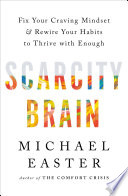

Scarcity is a fundamental concept that shapes human behavior and decision-making. The book delves into the psychological and economic implications of scarcity, explaining how limited resources can lead to stress and cognitive overload. When individuals perceive scarcity, their brains react by prioritizing immediate needs over long-term goals, which can lead to poor decision-making. The author uses various examples from psychology and behavioral economics to illustrate how scarcity affects our choices, often leading to a cycle of deprivation and suboptimal outcomes. This understanding is crucial for individuals and organizations alike as it highlights the importance of resource management and the need to create environments that mitigate the negative impacts of scarcity.
Continue readingThe book introduces the concept of the 'scarcity mindset,' which refers to the mental state that arises when individuals are faced with limited resources. This mindset can lead to a narrow focus on immediate problems, causing people to overlook broader opportunities and solutions. The author discusses how this mindset can perpetuate a cycle of poverty and stress, as individuals become trapped in their circumstances, unable to see beyond their immediate needs. By recognizing the scarcity mindset, individuals can work to shift their perspective, fostering a more abundant mindset that encourages creativity and long-term planning. This shift is essential for personal growth and resilience in the face of challenges.
Continue readingScarcity not only affects what we have but also how we think. The book explores the concept of cognitive load, which refers to the mental effort required to process information and make decisions. When individuals are faced with scarcity, their cognitive load increases, leading to decision fatigue. This fatigue can result in impulsive choices and a lack of focus on important long-term goals. The author emphasizes the need to manage cognitive load effectively, suggesting strategies such as simplifying choices and reducing distractions. By doing so, individuals can make better decisions, even in the face of scarcity, and maintain their mental well-being.
Continue readingThe environment plays a crucial role in shaping our responses to scarcity. The book discusses how external factors, such as social support, community resources, and economic conditions, can influence how individuals experience and react to scarcity. A supportive environment can mitigate the negative effects of scarcity, providing individuals with the resources and encouragement needed to overcome challenges. Conversely, a hostile or resource-poor environment can exacerbate feelings of scarcity and limit opportunities for growth. The author advocates for creating environments that foster abundance and support individuals in their efforts to thrive, emphasizing the importance of community and collaboration.
Continue readingThe book offers practical strategies for individuals and organizations to overcome the challenges posed by scarcity. These strategies include prioritizing time and resources, setting clear goals, and fostering a culture of collaboration and support. The author encourages readers to adopt a proactive approach to scarcity, viewing it as an opportunity for growth rather than a limitation. By implementing these strategies, individuals can cultivate resilience and adaptability, enabling them to navigate scarcity more effectively and achieve their long-term objectives.
Continue readingScarcity can have profound effects on interpersonal relationships. The book examines how feelings of scarcity can lead to conflict and competition, as individuals become more focused on their own needs and less able to empathize with others. This can create a cycle of mistrust and isolation, further exacerbating feelings of scarcity. The author emphasizes the importance of nurturing relationships and building social support networks as a means of countering the negative effects of scarcity. By fostering strong connections with others, individuals can create a sense of abundance that enhances their well-being and resilience.
Continue readingThe book challenges traditional notions of success, arguing that they often reflect a scarcity mindset. The author encourages readers to redefine success in terms of personal fulfillment, well-being, and community impact, rather than purely financial or material achievements. This shift in perspective can help individuals break free from the constraints of scarcity, allowing them to pursue meaningful goals that align with their values. By focusing on holistic success, individuals can cultivate a more abundant mindset and create a positive impact in their lives and the lives of others.
Continue readingThe reading time for Scarcity Brain depends on the reader's pace. However, this concise book summary covers the 7 key ideas from Scarcity Brain, allowing you to quickly understand the main concepts, insights, and practical applications in around 21 min.
Scarcity Brain is definitely worth reading. The book covers essential topics including Understanding Scarcity, The Scarcity Mindset, Cognitive Load and Decision Fatigue, providing practical insights and actionable advice. Whether you read the full book or our concise summary, Scarcity Brain delivers valuable knowledge that can help you improve your understanding and apply these concepts in your personal or professional life.
Scarcity Brain was written by Michael Easter.
If you enjoyed Scarcity Brain by Michael Easter and want to explore similar topics or deepen your understanding, we highly recommend these related book summaries:
These books cover related themes, complementary concepts, and will help you build upon the knowledge gained from Scarcity Brain. Each of these summaries provides concise insights that can further enhance your understanding and practical application of the ideas presented in Scarcity Brain.